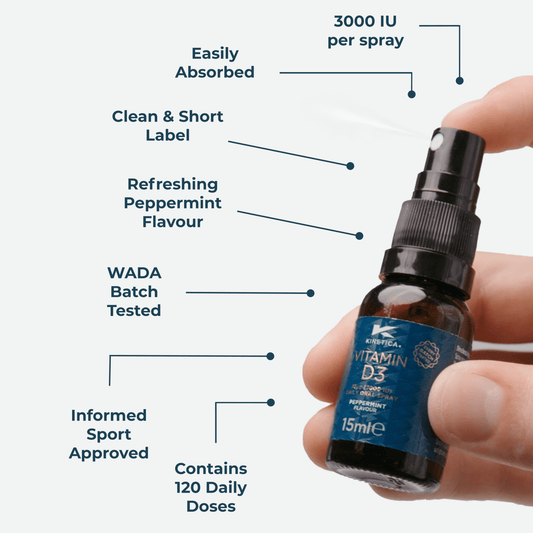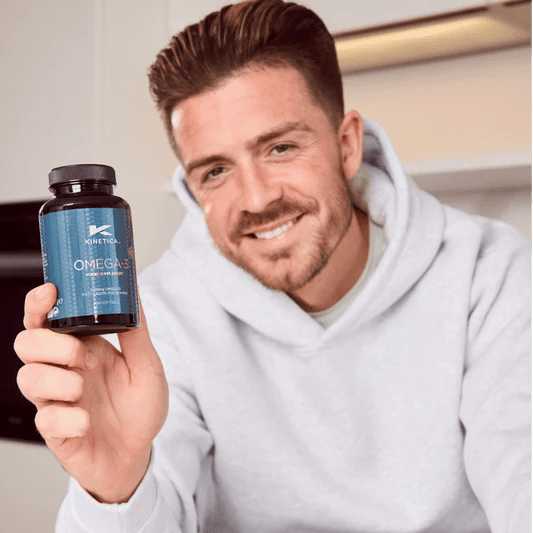Fuelling The Female Footballer

- Preparing with confidence
- Understanding the female athlete
- Nutrition framework for the female footballer
- Pre, during and post - match nutrition strategy
- The extra edge: Supplements for the female footballer
Preparing with Confidence
What allows you to perform at your best?
Performance is a combination of both physical and mental preparation.
As soon as you step over the line on match day, there’s a particular sense of confidence that can allow you to play with freedom and an ability to express yourself. Leading up to a match you want to prepare your body both physically and mentally to give yourself the best opportunity to possess that confidence.
The goal is to eliminate uncertainty and the decision fatigue that might cloud your mind, from fueling doubts to the discomfort of inadequate preparation. By adopting a personal preparation strategy that aligns with your preferences and is grounded in evidence, you can give yourself the best opportunity to step onto the pitch each week with confidence and clarity.
This guide draws from firsthand experiences as a female footballer and performance nutritionist to empower you with a personalised fueling strategy through science informed nutrition recommendations.

Understanding the Female Athlete:
Female athletes encounter unique physiological challenges, notably around the menstrual cycle, which can impact performance. However, with evidence in this area still scarce, it is best practice to follow the current sports nutrition guidelines, some of which we will cover today, to support optimal fueling in addition to collecting your own personal data around potential physical and emotional changes that may be experienced throughout the menstrual cycle (Holtzman, KE Ackerman, 2021).
In my experience both on and off the field, many athletes may be unaware of these guidelines, feel like they don’t apply to them, or under fuel due to psychological barriers (body image, disordered eating, self-confidence etc). Addressing these challenges requires a shift towards confident and appropriate fuelling, based on consistent practice and personal feedback. By understanding and embracing these nutrition strategies, female athletes can enhance their performance, improve recovery, and feel confident and ready to perform each week.
Nutrition framework for the Female Footballer
Nutrition is not a one size fits all ‘plan’ that you can just hand out to anyone. You need to create your own ‘recipe’ with the right ingredients for you within a science informed framework. This should accommodate the unique demands of training, matches, and recovery phases. This framework provides a science-informed structure for female footballers to optimise their fueling strategy, ensuring every meal and snack contributes to the appropriate phase.
1. Plan Ahead: Success starts with preparation. Begin by mapping out your week to identify key training days that demand fueling and days where the focus shifts towards recovery nutrition. A common obstacle to nutrition is the lack of a clear plan. Dedicate time at the start of each week to outline your main meals and snacks, especially pre- and post-training. This proactive approach ensures you're well-equipped to meet your nutrition needs without the stress of last-minute decision fatigue.
2. Periodise your nutrition: Adapt your carbohydrate intake based on the intensity and volume of your training. This means increasing carbohydrates during high-intensity training periods and tapering them during lighter sessions or rest days to fuel appropriately for the work required. This strategic approach helps to optimise energy use, supports recovery, and contributes to overall training efficacy.
3. Monitor: Keeping a close eye on your nutrition and its impact on performance is essential. This involves taking a regular note of how your body responds to different fueling strategies. Monitoring this can help you identify patterns, preferences, and potential areas for adjustment. Pay attention to your energy levels, your recovery quality, and your performances to gauge the effectiveness of your nutrition/preparation. Use this feedback to refine your approach so that you can make personal data-informed decisions that align with your body's needs and performance goals. I find it helpful to keep a separate personal journal for this.
Beyond these foundational strategies, the framework encompasses key nutrition components critical for female footballers:
Key macronutrients for each meal:
Carbohydrates: As the primary fuel source for high-intensity work, adequate carbohydrate intake is essential. Timing and quality matter; Focus on timing of carbohydrates around training sessions to optimise performance and recovery. Focus on complex carbohydrates in meals further away from training and matches (like rice, pasta, potatoes and oats) for a slower release in energy and simple carbohydrates (like energy gels, granola bars, sports drinks) closer to training and games for a faster release in energy (Collins et al, 2021).

Shop Now: Energy Supplements
Protein: Vital for muscle repair and recovery. Aim to meet your total daily protein target of 1.6 - 2g per kg / day. Distribute your protein intake evenly throughout the day, with a focus also on high-quality sources post-training/matches to enhance recovery. With high protein demands, a whey supplement can support your daily requirements within a diet rich in high quality protein sources from food, for example meat, fish, dairy products, beans & pulses in each of your meals.
Fats: Essential for overall health, fats should not be neglected within a footballer’s diet. Focus on sources rich in omega-3 fatty acids within your diet (such as nuts, seeds, olive oil, avocado, salmon/oily fish) to support hormone function, inflammatory response and support the overall recovery process. Omega-3 capsules can support Omega 3 intake also if you’re struggling to get it through your diet.

Shop More: Omega-3 Capsules
A good structure with your meals, focusing on each of these key nutrients, will make it easier to meet your daily needs. A good approach to follow each day as a start is 3 key meals + 2 key snacks (pre & post training).
Hydration and electrolytes:
No other nutrition intervention has the performance enhancing effects of staying well-hydrated. This is due to its influence on mental performance as well as physical, which is often overlooked. Hydration is critical for footballers especially considering the sweat losses during intense training and matches. Footballers should prioritise fluid intake before, during, and after exercise, adjusting for climate conditions and individual sweat rates. Electrolyte replenishment, particularly sodium, is also important for maintaining fluid balance.

Shop More: Electrolyte Tablets
Iron and bone health:
Female footballers are at particular risk of iron deficiency and reduced bone mineral density, partly due to the impact of intense training, menstrual periods and potential dietary restrictions/underfueling. Regular monitoring of iron status and emphasising iron-rich foods in your diet such as red meat, green leafy veg, legumes, nuts & seeds coupled with adequate calcium and vitamin D intake, supports bone health for females and overall well-being.
The menstrual cycle:
The menstrual cycle can have an impact on performance, energy levels, and nutrition needs. This is very individual as each female's cycle experience is different and will require a different approach and solution to support the individual experience/symptom. Tracking your menstrual cycle and adjusting nutrition strategy as well as adjusting recovery and emotional regulation (mindful practices) accordingly can help mitigate potential negative effects, helping you to support your performance, recovery and more importantly, manage wellbeing throughout your cycle.
Pre, During and Post Match Nutrition:
Pre-match nutrition: Aim to consume a meal rich in carbohydrates 3-4 hours before the match to ensure a stable energy supply. Then a small, carbohydrate-rich snack 30-60 minutes before kick-off to top up energy stores. An example might be some homemade pancakes topped with some granola, berries and honey for pre match, then topped off with a cereal bar or an energy gel just before kick-off.
In-game nutrition: Maintaining hydration with a focus on electrolyte balance is crucial during the match. Small amounts of carbohydrates can also help to sustain performance - Using an energy gel or a sports drink can help to top up carbohydrate stores at half time and reduce fatigue in the final minutes of the match.


Shop More: Energy Gels Cola
Recovery nutrition: Post-match, focus on replenishing glycogen stores with carbohydrates and providing protein for muscle repair along with fluids to replace fluid losses. A flavoured milk supports all 3 post-match requirements (carbohydrates, protein + fluid & electrolytes) in an easy to consume manner. As appetite can be compromised after intense training sessions or matches, Kinetica's Clear Whey can provide a refreshing alternative that can be paired with a carbohydrate source like a banana or granola bar so you are still meeting your recovery needs.
The extra edge: Supplements for the female footballer
When you have a solid game plan for your meals throughout the week based on the above approach, certain supplements can offer additional benefits to your performance and recovery to give you that extra edge. Here are the supplements you might want to consider as a female footballer aiming to optimise your performance.
Whey Protein: A high-quality protein source that supports muscle repair and recovery, whey protein can help you meet your daily protein requirements more easily, especially after intense training sessions. If you're vegan or dairy intolerant, opt for a high-quality vegan protein powder.
Creatine: Creatine is one of the most researched supplements in sports nutrition. Incorporating creatine can help improve short bursts of speed, strength and power output making it a valuable addition for female footballers seeking to enhance their performance on the pitch (Peeling et al, 2018).
Omega-3 Fish Oil: These essential fats play a significant role in managing inflammation and supporting recovery such as reduced muscle soreness, making it a staple for female footballers focused on longevity and resilience in their career (Thielecke et al, 2020).
Vitamin D: Supports female footballers by enhancing muscle function and bone health, crucial for performance and injury prevention. It also supports the immune system and aids in reducing inflammation, facilitating speedy recovery from training and matches (Holtzman, B. and Ackerman, K.E, 2021; de La Puente Yagüe 2020).

Shop More: Vitamin D3 Spray
These guidelines, when adopted within your own individual structure will allow you to really get the best out of your ability and fuel your potential on and off the pitch.
Build trust in these principles by developing your fueling strategy and gathering your own feedback on your experience of implementing these recommendations. Only then will you really experience the benefits of good preparation and nutrition practice.














